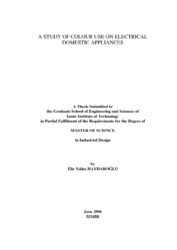Please use this identifier to cite or link to this item:
https://hdl.handle.net/11147/3385Full metadata record
| DC Field | Value | Language |
|---|---|---|
| dc.contributor.advisor | Kidöz, Şölen | en |
| dc.contributor.author | Haydaroğlu, Elir Yıldız | - |
| dc.date.accessioned | 2014-07-22T13:51:26Z | - |
| dc.date.available | 2014-07-22T13:51:26Z | - |
| dc.date.issued | 2006 | en |
| dc.identifier.uri | http://hdl.handle.net/11147/3385 | - |
| dc.description | Thesis (Master)--Izmir Institute of Technology, Industrial Design, Izmir, 2006 | en |
| dc.description | Includes bibliographical references (leaves: 86-90) | en |
| dc.description | Text in English; Abstract: Turkish and English | en |
| dc.description | ix, 107 leaves | en |
| dc.description.abstract | Colours have a crucial importance in human life. Humans use colours to give meaning to objects and to express their feelings, either visually either verbally. While colours and their associations may differ in different societies, their objectives in use are similar (like religious associations, status symbols, and to add aesthetic values, etc.). Whatever are the pleasures, styles or fashions of the time, the importance of colour’s role in desirability of an object remains constant. Especially, in the post-Industrial Revolution era with the progression the field of communication, the cultural differences between societies decreased. Thus at the 20 th Century with the international design movements colour became a common language in the field of design. When first released the means of the electrical domestic appliances were helping house-works. But in the 20 th century they changed identity and from bottom of the staircases and inside of cupboards, they took place on counter-tops and inside of the space lived-in. When this process is studied it is cleared out the role of colours on domestic appliances to gain their status. Considering too far apart and different from each other at first glance, colours and art, and house-works are parts of the same life; therefore their changes and progress’ are contemporaneously similar with the changes at the social life. In this work it is aimed to study the reasons of colour use in electrical domestic appliances, in historic, scientific and sociologic way. And by these means’ it is reached to the conclusion that the characteristics of the colour schemes and the nature of the task are in accordance in electrical domestic appliances. According to this conclusion white has a sterile feeling and associated with hygiene, black and dark colours to the strength and elegance, pastel colours to cooperation an bright colours to be the focus of attention. | en |
| dc.language.iso | en | en_US |
| dc.publisher | Izmir Institute of Technology | en |
| dc.rights | info:eu-repo/semantics/openAccess | en_US |
| dc.subject.lcc | NK1548 .H41 2006 | en |
| dc.subject.lcsh | Color in design | en |
| dc.subject.lcsh | Household appliances, Electric | en |
| dc.title | A study of colours use electrical domestic appliance | en_US |
| dc.type | Master Thesis | en_US |
| dc.institutionauthor | Haydaroğlu, Elir Yıldız | - |
| dc.department | Thesis (Master)--İzmir Institute of Technology, Industrial Design | en_US |
| dc.relation.publicationcategory | Tez | en_US |
| item.languageiso639-1 | en | - |
| item.fulltext | With Fulltext | - |
| item.openairecristype | http://purl.org/coar/resource_type/c_18cf | - |
| item.openairetype | Master Thesis | - |
| item.grantfulltext | open | - |
| item.cerifentitytype | Publications | - |
| Appears in Collections: | Master Degree / Yüksek Lisans Tezleri | |
Files in This Item:
| File | Description | Size | Format | |
|---|---|---|---|---|
| T000540.pdf | MasterThesis | 7.82 MB | Adobe PDF |  View/Open |
CORE Recommender
Page view(s)
72
checked on Jul 22, 2024
Download(s)
42
checked on Jul 22, 2024
Google ScholarTM
Check
Items in GCRIS Repository are protected by copyright, with all rights reserved, unless otherwise indicated.